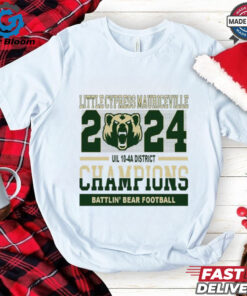Official Little Cypress Mauriceville 2024 Uil 10 4A District Champions Battlin’ Bear Football Shirt
Still works, I still can receive calls or texts, I keep. I have a Official Little Cypress Mauriceville 2024 Uil 10 4A District Champions Battlin’ Bear Football Shirt jacket that I bought in 2019, in Berlin, I still have. We have several brand clothes and shoes, jewelries and accessories, and we have several non brand too. Obviously if we go and sign a contract, we put our Versace, Gucci, Dior or D&G outfits, but at home we mainly wear denim, a tshirt, slipper and if we leave the house, we mostly wear Adidas, or Puma sneakers and something pretty comfortable clothes. During this long weekend we travel to Miami, Florida and we attend on a golf course to meet some potential clients. So yesterday I bought a new outfit.
 ()
()Official Little Cypress Mauriceville 2024 Uil 10 4A District Champions Battlin’ Bear Football Shirt hoodie, tank top, sweater and long sleeve t-shirt: best style for you
As for the guards, well, they got a report from a whole lot of Official Little Cypress Mauriceville 2024 Uil 10 4A District Champions Battlin’ Bear Football Shirt about some guy who ran in and opened up their curtains which is why there was so much screaming. And unfortunately up to that point, there was no one who stated that the screaming started BEFORE I ran in there. So by the time the cops took me away, I saw that all the bags were gone and I was screwed.
 ()
()In Korea, where it’s called Seollal, there’s also a complicated political history behind the Official Little Cypress Mauriceville 2024 Uil 10 4A District Champions Battlin’ Bear Football Shirt. According to UC Davis associate professor of Korean and Japanese history Kyu Hyun Kim, Lunar New Year didn’t become an officially recognized holiday until 1985 despite the fact that many Koreans had traditionally observed it for hundreds of years. Why? Under Japanese imperialist rule from 1895 to 1945, Lunar New Year was deemed a morally and economically wasteful holiday in Korea, Kim said, despite the fact that Lunar New Year has always been one of the country’s biggest holidays for commercial consumption. But Koreans never stopped celebrating Lunar New Year simply because the government didn’t recognize it as a federal holiday, Kim said. So as South Korea shifted from a military dictatorship towards a more democratized society in the 1980s, mounting pressure from the public to have official holidays and relax the country’s tiring work culture led to the holiday being added to the federal calendar as a three-day period.
 ()
()- Production Time: All orders are processed within 3 – 4 business days.
- Shipping Time: You will receive your order anywhere from 5 – 10 business days (depending on the shipping method you chose) from the date that it is shipped out, not the date the order is placed.
- Return & Exchange: A full-refund of your purchase! Absolutely risk-free, no question asked. In case of defective or damaged goods, we will send a replacement to you (No any extra fee) within 30 days since your purchase.
- Tracking Number: When available, we will send you the tracking number with the confirmation email so that you can track the package online.
- Worldwide Shipping Available: At limotees, we ships products to over 100 countries worldwide. Shipping rates and fees may vary depending on your country or region.
- If you have any other queries, please feel free to email us at [email protected]
This Flowers having a Weird Mom builds character Xmas Day T-shirt, hoodie, sweater, tank top, long sleeve, and V-neck t-shirt is a made-to-order product, It is designed by TeeJeep LLC. This is a limited edition product was made in the USA.
Brand: TeeJeep Clothing LLC, Inc. - An online fashion company in the USA
At TeeJeep LLC, we have provided quality T-shirts that are sure to make you feel comfortable and cool even in the scorching heat or cold weather. We also seek to provide our customers with the highest level of customer service possible by adhering to customer satisfaction policies and an open communication style. T-SHIRT FEATURES: - High quality 100% Soft cotton (fiber content may vary for different colors) UNISEX shirt. HOODIE and SWEATSHIRTS FEATURES: - 50% Cotton; 50% Polyester (fibre content may vary for different colors) - IMPORTANT: Runs true to size. Are buyers responsibility to consult the size chart before placing the order. - The design is printed on the t-shirt with a digital printer. - If you want to CUSTOMIZE more this product, please send me a message. CARE: - Machine wash, with cold water, and inside out - Tumble dry on low or hang to dry - DO not iron directly on the design ♥ HOW TO ORDER T-SHIRT, HOODIE, SWEATSHIRT , LONGSLEEVE








